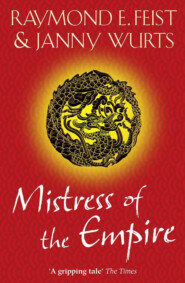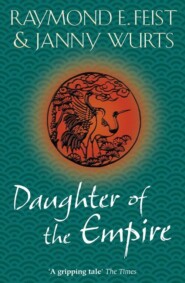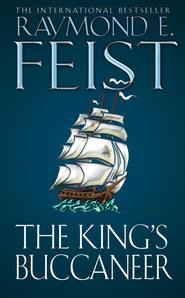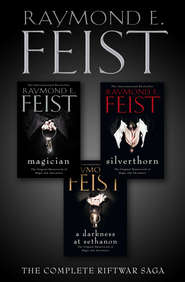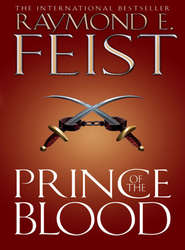По всем вопросам обращайтесь на: info@litportal.ru
(©) 2003-2025.
✖
The Complete Legends of the Riftwar Trilogy: Honoured Enemy, Murder in Lamut, Jimmy the Hand
Автор
Год написания книги
2018
Настройки чтения
Размер шрифта
Высота строк
Поля
From the moment he had laid eyes upon Anleah, Bovai was smitten, though he had no tongue to tell her, or his father. It was Morvai, the elder brother, who had always had the knack for smooth words and finely-turned phrases, who had pressed his suit.
Morvai spent as much time with Anleah as was possible, and Bovai retreated deeper into his silent longing for the girl, until the night when Morvai had asked their father to intercede with Murad, not to return the girl to her clan, but rather to send gifts and seek permission of her father for Morvai to take Anleah for his wife.
Gaduin had laughed and revealed his true intent in leading the raid and taking her prisoner. The bitter rivalry with Clan Badger had consumed the two clans for decades and scores of the best warriors on both sides had died. It had always been Gaduin’s hope that Morvai would find her becoming, and take her as wife.
She was too young to rule and had no brother, and no chieftain in Clan Badger held enough power to hold that clan together once her father joined the Mothers and Fathers in the next world. Murad had no offspring, though he had numbered three wives over the years. Gaduin saw his eldest son as the logical inheritor of the Paramount Chieftain’s mantle some day, and knew that with Anleah as his wife, the two clans would eventually be joined. Thus peace would be established, and the strength of Clan Raven doubled by the alliance, with the possibility of Clan Raven eventually absorbing Clan Badger under the rule of Morvai, and after him the children of his union to Anleah. With two of the greatest clans in Yabon united, the process could begin for the taking of the others.
And it was clear at that moment to Bovai that he must stand aside and remain silent. He feigned delight at his brother’s happiness, and said nothing when his father dispatched an embassy to Clan Badger proposing the truce and to negotiate a bride price.
Bovai accepted this out of love for his brother, though it burned his heart. What burned even more was that Morvai was so taken with Anleah’s charms that he never realized the anguish this caused his brother. So Bovai forced his gaze to look elsewhere when Anleah walked past, averting his eyes when she ate at their table, struggling not to notice the scent of her hair, the dark flicker of her eyes, the power of her voice.
Less and less did Morvai go to the hunt with his brother and a strain developed between them. Days would pass when they barely spoke and he tried to believe that it was because Morvai had begun his courtship: a series of rituals that could take years before he and Anleah could come together at last. Bovai feared that his brother suspected Bovai’s hidden longings, and so the estrangement became mutual. Later, Bovai realized the odd distraction Morvai had shown had nothing to do with his betrothal to Anleah or to any concern over his brother: rather it was the first stirring of that cursed pull from Elvandar – what the eledhel called ‘the Returning’.
Days passed into weeks, and Bovai lived on a diet of pain and longing. Then one day, Gaduin announced the betrothal of Morvai and Anleah with the plan that they would be married on Midsummer’s Day.
Six days before Midsummer’s Day, the entirety of Anleah’s family, complete with retainers and warriors of note, arrived for the wedding rites. Bovai found it strange to be surrounded by warriors of Clan Badger, since he recognized more than one from fights of old. In their midst was a warrior whose countenance bore bitterness and gloom, and his name was Kavala. While others in his clan seemed pleased at the marriage and the forging of a bond between the clans, Bovai knew that this warrior regarded his brother with a special hatred. For if any warrior in Clan Badger was likely to follow Vergalus as Chieftain of Clan Badger, it would be Kavala. Yet he saw the future as clearly as a hunter saw a buck in a clearing. Should this wedding go forward, he would some day have to bend a knee to Morvai and swear allegiance.
In addition, years before, in one of the many skirmishes between Badger and Raven, Morvai had killed Kavala’s brother. Bovai knew that Kavala had one more reason than he needed to hate Morvai.
The reception of the Clan Badger warriors and the family of Anleah was cool at first, but by the end of the evening toasts were raised by both sides, pledging the end of hostilities, and both Gaduin and Vergalus were open-handed in the paying of blood-debt gifts to the fathers, brothers and sons of warriors slain in battles of old, those who had not yet been avenged. Kavala had been tight-lipped, but he had uttered the ritual words as Morvai presented him with a finely-fashioned bow of yew and bone as a debt-payment for killing Kavala’s brother. No hint of forgiveness was evident, but he observed the formalities. Thus was the feud ended.
While this ritual was going on there came a moment when Bovai saw Morvai alone and he approached his brother’s side.
The look in Morvai’s eyes was one of warning.
‘If you come to tell me that you love her, I know,’ Morvai said evenly.
Stunned Bovai could not reply.
Morvai put his hand upon his brother’s arm. ‘You have acted with honour.’ Then he spoke softly. ‘The heart wants what it wants. Always remember that, no matter what else happens.’
Bovai found he could not speak. And then Morvai turned away, broke into a smile and extended a hand to his bride’s father, and the two of them clasped hands firmly, then shared a drink from the same goblet.
Bovai had looked over at Anleah, seated at the feasting table and, seeing her aglow with love for Morvai, had felt his heart might shatter within his chest, for he knew that he would never see her look at him in that way.
Throughout the ceremony he had stood by his brother’s side, heart filled – at first – with pain, but when he had seen his brother kiss her, he had forced his mind away from his pain, and willed his heart to ice. He would never love again, if love meant such pain.
He had seen something else at that ceremony: the look she gave to Kavala. It had been warm – a friend’s smile – yet the look Kavala had returned to her told Bovai that now Kavala had three reasons to hate Morvai. He saw a reflection of his own longing mirrored in Kavala’s expression, just for an instant, only a brief flicker; but Bovai had seen it.
When, at long last, protocol permitted, Bovai fled, leaving the feast for fear that his stomach would rebel and that he would vomit. His pain drove him from the camp. He took his bow and told a sentry he was going hunting.
For five days he absented himself from his father’s compound.
For a year and a month, Bovai and his brother lived without comment. Anleah grew more beautiful, happy in her marriage. Every smile and laugh was a dagger in Bovai’s heart, for he knew the laughter and the smiles were for Morvai. She loved him with an intensity only a few of the moredhel ever knew, and even the most reticent among the warriors would smile at the sight of her singing on her way to the stream to clean clothing, or as she tended the garden.
But Morvai grew more reflective, more thoughtful, and disappeared alone in the forest for days at a time, often returning without game. There were days when he would suddenly become distracted while in conversations, as if he were listening to some distant call.
One day Morvai called Bovai to his side and said something that troubled his brother for months to come. ‘Should I fall, brother, should anything happen to me … will you look after Anleah?’
Bovai said, ‘Of course, but nothing will happen.’
Morvai smiled and said, ‘Fate is fickle, brother. Rest assured, something will happen.’ He put his hand on his younger brother’s arm. ‘See to her needs. Take her back to the lodge of her father, should that be her wish.’
‘I will,’ said Bovai.
Months fled, the seasons passed, and Morvai became ever more distracted. Gaduin asked Bovai if he knew what troubled his eldest son, but Bovai could think of nothing. Yet Bovai also sensed a deepening unease within his brother’s soul.
Then, in late summer of the third year following the marriage, Morvai finally changed. No moredhel needed to be told when a family member made the change, known by the eledhel as the Returning. Bovai awoke an hour before dawn one day with a dread sense that something was terribly wrong. He was already out of his bed and in the courtyard of the compound, buckling his sword-belt, when he heard Anleah scream.
He had raced with his father and other warriors to Morvai’s lodge, and inside found Anleah standing before an empty bed.
‘What is it, woman?’ Gaduin shouted.
Softly, with tears flowing down her cheeks, Anleah spoke. ‘I awoke to find a stranger in this room, father of my …’ Her voice broke. ‘My husband is no more.’
A cold more frigid than ice stabbed through Bovai’s stomach. He glanced at his father and saw the old warrior’s implacability. While his mask remained in place, all colour had drained from his cheeks.
Softly, Gaduin said, ‘We must find the traitor. He must die.’
Bovai felt the same pent-up rage and fear that his father was suppressing. Their beloved brother and son had changed. He was no longer of their blood. The evil Queen of Elvandar’s black arts had lured away another of their people: even as they stood there, the being who had once been Morvai was making his way southward, toward the haven of Elvandar.
Bovai signalled and warriors hurried back to their own lodges to get weapons. Within minutes, fifty moredhel had made their way into the forest, after Morvai.
The chase had been brutal, with no respite for either prey or hunters. In the memory of their race, there had been no greater affront to a clan than this. Even those renegades who had been banished by their own people and who lived in communities of humans and goblins might some day redeem their honour. But one who fled to Elvandar was a betrayer of everything that made one a member of the People, a moredhel.
For six days they ran through the forests, swamps and bogs of Yabon. At last they came to the river marking the boundary of Elvandar.
Bovai had glimpsed his brother three times in the chase; once upon the crest of a hill, another time moving into distant trees on the other side of a valley; and there at the river’s edge.
Bovai had unleashed an arrow which had arched high into the sky only to strike futilely mere yards behind his brother as he splashed through the water.
Figures in tunics with bows waited on the far bank, watching to see how close Bovai and the others would approach their border. Bovai’s rage overcame his caution and he ran forward to try to kill the traitor before he reached the shelter of the trees on the other side of the river. He nocked an arrow as he ran, then quickly planted his feet and sighted, forcing himself to accuracy, for this would be his final shot.
As he drew, so did those behind him, and they were answered by the enemy across the river. His own arrow had left the bowstring a scant moment before others, and with a howl of frustration he had seen the shaft fall inches short. Then his shout of rage had turned to pain as an elven arrow struck him in the thigh.
Two of his companions had had to drag him to safety, for even wounded, Bovai was ready to charge across the river.
The last he saw of the creature who had once been his brother was his back as he disappeared into the darkness of Elvandar.
‘Bovai?’
He stirred from his painful memories.
It was Golun, leader of his scouts.
‘Yes?’
Golun saw that Bovai’s arm was still bared in spite of the icy cold.






